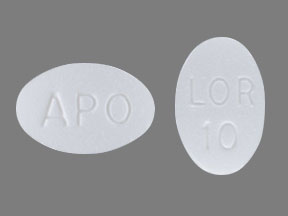
Allergy Relief (loratadine) Coupons & Savings Card – Discount Prices from $5.95
Brand for: Loratadine
My prescription
Edit
10MG, Loratadine (30 Tablets)
Select pharmacy

Walgreens
$5.95
COUPON PRICE
Albertsons
$8.04
COUPON PRICEAllergy Relief (loratadine) savings card
Show this card to your pharmacist
Walgreens
$5.95
BIN
ID
PCN
GRP
015995
LHKPW917524
GDC
DR33
Powered by
More prescriptions for allergic rhinitis
More prescriptions for allergic rhinitis
Allergy Relief (loratadine) (Loratadine) dosage forms
Dosage Quantity Price from Per unit 10MG 30 Tablets $10.46 $0.35 10MG 1 Tablet $9.05 $9.05 10MG 3 Tablets $9.15 $3.05 10MG 5 Tablets $9.24 $1.85 10MG 7 Tablets $9.34 $1.33 10MG 10 Tablets $9.49 $0.95 10MG 14 Tablets $9.68 $0.69 10MG 15 Tablets $9.73 $0.65 10MG 20 Tablets $9.98 $0.50 10MG 28 Tablets $10.37 $0.37
| Dosage | Quantity | Price from | Per unit |
|---|---|---|---|
| 10MG | 30 Tablets | $10.46 | $0.35 |
| 10MG | 1 Tablet | $9.05 | $9.05 |
| 10MG | 3 Tablets | $9.15 | $3.05 |
| 10MG | 5 Tablets | $9.24 | $1.85 |
| 10MG | 7 Tablets | $9.34 | $1.33 |
| 10MG | 10 Tablets | $9.49 | $0.95 |
| 10MG | 14 Tablets | $9.68 | $0.69 |
| 10MG | 15 Tablets | $9.73 | $0.65 |
| 10MG | 20 Tablets | $9.98 | $0.50 |
| 10MG | 28 Tablets | $10.37 | $0.37 |
| 10MG | 50 Tablets | $11.44 | $0.23 |
| 10MG | 60 Tablets | $11.93 | $0.20 |
| 10MG | 90 Tablets | $19.79 | $0.22 |
| 10MG | 100 Tablets | $20.33 | $0.20 |
| 10MG | 300 Tablets | $30.98 | $0.10 |
| 10MG | 500 Tablets | $41.64 | $0.08 |
| 10MG | 1000 Tablets | $66.80 | $0.07 |
| 10MG | 3000 Tablets | $164.40 | $0.06 |
| 10MG | 9000 Tablets | $457.20 | $0.05 |
Is loratadine good for allergies?
Yes, loratadine is an antihistamine commonly used to relieve symptoms associated with allergies, such as sneezing, runny nose, and itchy or watery eyes. It is effective for treating allergic rhinitis and other allergy-related symptoms.
Is loratadine the same as Benadryl?
Loratadine and Benadryl are not the same. Loratadine is an antihistamine commonly known by the brand name Claritin, while Benadryl contains diphenhydramine, another type of antihistamine. Both are used to treat allergy symptoms, but they have different active ingredients and may have different side effects and durations of action.
Will loratadine make you sleepy?
Loratadine is a non-drowsy antihistamine, so it is less likely to cause sleepiness compared to other antihistamines. However, some individuals may still experience drowsiness as a side effect. It is advisable to monitor how one reacts to the medication and avoid activities that require full alertness if drowsiness occurs.
What to avoid when taking loratadine?
When taking loratadine, it is advisable to avoid consuming alcohol, as it can increase the risk of side effects such as drowsiness. Additionally, one should avoid operating heavy machinery or driving until they know how loratadine affects them, as it can cause dizziness in some individuals. It is also important to avoid taking other antihistamines concurrently unless directed by a healthcare provider.
Should I take Zyrtec or loratadine?
Both Zyrtec (cetirizine) and loratadine are antihistamines used to relieve allergy symptoms. The choice between them can depend on individual response and side effects. Zyrtec may cause more drowsiness in some people compared to loratadine. It is advisable to consider personal tolerance, any previous experiences with these medications, and consult with a healthcare provider to determine which is more suitable for your specific needs.
